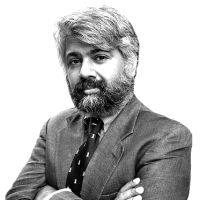Mario Götze has the face of a choirboy and the sort of wispy fuzz on his chin that would be derided as “bum fluff” in an unforgiving schoolyard. He also has venom in his striker’s boots, venom with which he delivered death to Argentina in the World Cup final in Rio de Janeiro.
We had had a captivating but goalless 90 minutes of regulation play and were in the game’s supplementary phase. Andre Schürrle, Germany’s winger, ran down Argentina’s left flank and looped a luscious pass to Götze in the 23rd minute of extra time. Götze, the German center-forward, had made his way into a scoring position behind a scrum of defenders, and what he did next was balletic and ruthless: He let the ball come on to his chest, which was tensed to receive it but soft enough to drop the ball to his feet; and as the ball descended, the pace of Schürrle’s pass having been taken off it, Götze whipped it into the Argentine goal. Germany led 1-0. Minutes later, it had won, 1-0.
Let us pause, here, for a taste of numbers: Until Götze’s goal, scored with just over six minutes left on the clock, Argentina had not conceded for 457 minutes of play. That is an astonishing spell of impregnability, one that looked set to last through to a penalty shoot-out tonight. In dramatic narrative, this was the match-up of accomplished opposites: Superb attackers (the Germans), versus consummate counter-attackers (the Argentines); the team with the most goals in the World Cup against the one that had been hardest to score against.
In the scheme of football justice, righteous victory should always be the attackers’, and in that sense Germany deserved to hold aloft the Cup. Yet Argentina had the best chances of the game, one of which will give Gonzalo Higuain, the man who missed it, nightmares for the rest of his life. In the 21st minute, Toni Kroos, the industrious (and likeable) German midfielder, attempted to head the ball back to his own goalkeeper, plopping the ball instead at the feet of Higuain, Argentina’s striker. It was as if the latter had been handed a bounteous gift, a hamper full of every sort of wurst and ham, with Kroos even offering to set up table for him. And what would sir like to drink with his repast?
All Higuain had to do was pause, mark his target, and kick Argentina to ecstasy. But Higuain lost his sang-froid. He kicked too early, and he kicked wide. As if on cue, the TV commentators asked “Will he live to regret that?” This writer, who had fancied Argentina as victors all along, was beset at this point with a queasy feeling in the pit of his stomach. The Germans would, surely, punish such profligacy.
Both sides had a handful of chances: Benedikt Howedes cannoned a header onto the Argentine goal post just before halftime, and Rodrigo Palacio made a pig’s ear (to match his execrable hairstyle) of a gilded opportunity to score midway through the second half. Lionel Messi, who went into this game with the intention of securing the world’s recognition as an “undisputed great,” showed us teasing, taunting flashes of his virtuosity. But he did not deliver, his last free kick, taken 25 yards from the German goal, being a forlorn, clumsy attempt to conjure some magic. He seemed miffed, after the game, to be adjudged the best player of the tournament. In truth, he wasn’t the best at all; and the frown on his face suggested that he knew that the award was a sop. (The best player was Manuel Neuer, Germany’s goalkeeper, but ‘keepers are seldom lauded in this way.)
As a spectacle, the final was more than pleasing. Not since 1986, in Mexico City, has there been a more accomplished and entertaining first half as the one we witnessed at Rio. Both teams played with guts and ambition, and they were mindful, one assumes, of not repeating the infernal horror that was the final in 1990, when the two sides last met for the Cup. After a month in Brazil, we had the two best teams contest the last game; and as the hosts sulked, bewildered still by their ignominious absence from the final, we were given a game to remember, a lesson in the defensive arts. But it lacked the one ingredient that has largely been absent from this World Cup: cold-blooded finishing in front of goal. For that we’ll have to wait until 2018, in Russia, a more suitable venue for all things cut-throat.






